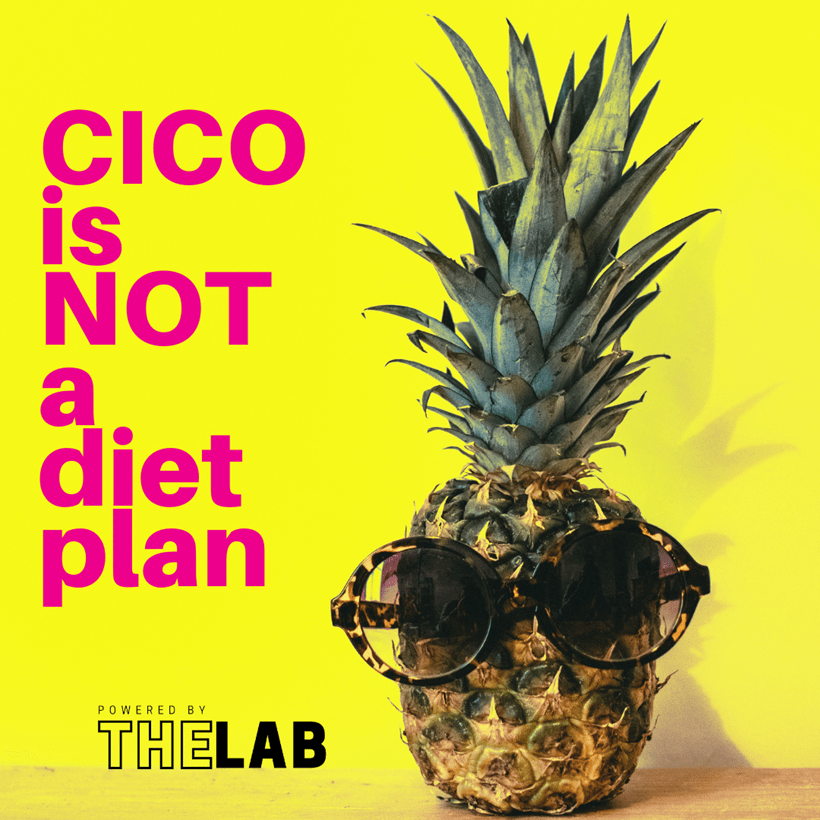CICO, or calories in vs. calories out, is the underlying principle of weight loss, and has been a public health message for many decades. And whilst CICO is scientifically accurate, as a public health message it has been a train wreck. The outcome of this message has been too great of a focus on calories and cardio exercise with important things like food and exercise quality being overlooked. This resulted in starvation diets coupled with excessive volumes of aerobic-based exercise. Weirdly this didn’t produce significant long-term weight loss or health improvements for most of the population. It’s almost like underfeeding yourself and punishing yourself with excessive exercise isn’t good for you?! 😉 🤪
What is incredibly frustrating, is that scientists, dieticians and other health professionals know there is more to the CICO message than simply eating less and moving more. They know there are nuances, considerations and caveats, which all require context and individual considerations. Any health professional worth their weight, would recommend a personalised nutritional approach over a blanket and ambiguous message like “eat less and move more”. Yet somehow, that is the message that keeps getting pounded into the public’s head over and over again.
So whilst the general idea of eating less and moving more is the right step forward, there is some context around this worth considering….
- Yes eating less food overall is a great idea when you’re trying to lose weight BUT you want to be eating less junk food and REPLACING it with nutrient dense food (i.e. food with lots of vitamins and minerals); especially nutrient dense protein-based foods. You can never eat the same volume of nutrient rich food as junk food (calorie for calorie) so the happy consequence is that you’re eating a tonne more food, with far fewer calories. #winning
- The “eat less” message resulted in people thinking the diet was only working if they were hungry. But eating so little that you’re perpetually hungry is a TERRIBLE idea as you will eventually cave and binge. The restrict-binge cycle is incredibly damaging to both your physical and psychological health. Significant changes occur metabolically, hormonally and psychologically that make future weight loss attempts more difficult. Sadly, the earlier it starts, the harder it is to change. So, parents take note – never put your children on diets!
- CICO lead to the low-fat disaster where food was generally judged on healthfulness, simply by the calories it contained. This lead to diets that were both nutrient poor and insufficient in protein, which is an absolute car-crash in terms of satiety (fullness) and body composition.
- Despite popular opinion, a calorie deficit can be achieved without calorie counting. You can lose weight simply by chaining the quality of your food, eating intuitively or through macro tracking.
- Also contrary to popular belief, an aggressive deficit is not needed for weight loss and can actually be counterproductive, to long-term weight loss. Aggressive deficits are very restrictive (socially and nutritionally), which means they require significant discipline, making them hard to maintain.
- Research has also shown that cardio is an inefficient way to change your body composition but especially problematic is high intensity cardio such as HIIT, which has been shown to blunt the hypertrophic (muscle building response). If you want to change your body, you need to build muscle!
- Weight training is the best form of exercise for changing body composition. The more muscle mass you have, the greater your fat-burning capacity. If you couple this with adequate protein intake, you are on the way to a winning formula!
- Recovery is just as crucial as training and unfortunately, the CICO message has led people to believe that they need to be doing hours of arduous exercise every single day. Not only does this lead to poor exercise adherence but it’s also contrary to research. What’s known is that it is better to do fewer, well executed sessions than many, half-hearted sessions. It is also crucial to rest, to allow the full hypertrophic response to occur.
- Unfortunately, CICO has also gone hand in hand with BMI (a metric that should only be used for population studies), which has led to many people trying to achieve a BMI that is unobtainable for them. The latest on body composition research indicates that it is likely that we all have an individual ideal body fat range for health (shock of all shocks). This means that it is likely that there is a very wide range of healthy body fat percentages rather than a relatively narrow BMI range.
- The cruel side-effect of the CICO message has been that those who have not been able to lose weight by “simply” eating less and moving more, have become social pariah; labelled as stupid, lazy and glutinous. This may have been unintended but the pain people have felt from the associated stigma is not diminished by lack of intention.
So whilst no-one is disputing we should be more physically active and curb our junk eating ways; I think it’s important to make sure that people understand that the type and quality of the food we eat and the exercise we do is so much more important than just the volume of them both.

